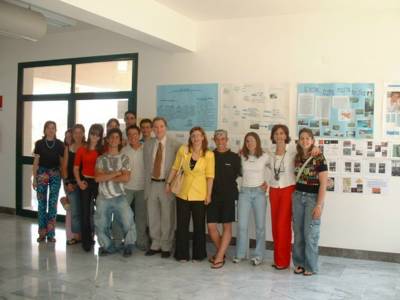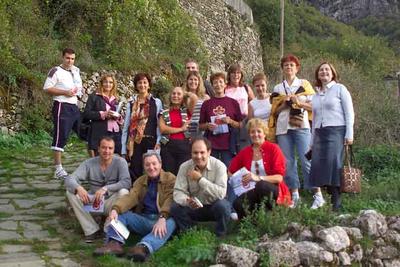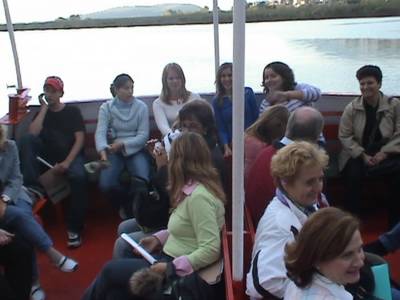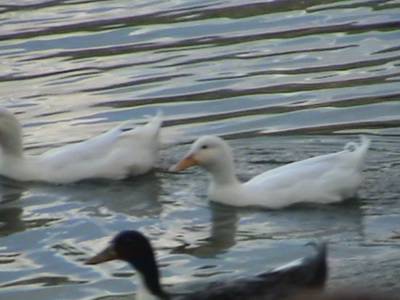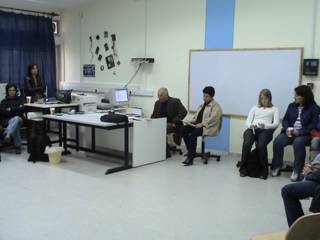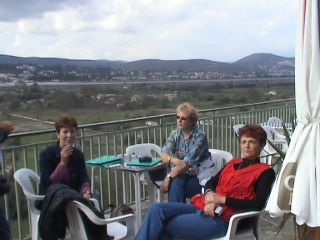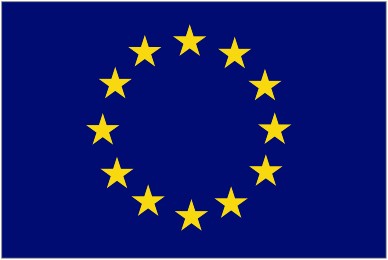Antonino Riccobono, Principal
Anna Bevaqua, teacher, coordinator
Anna Tadeo, teacher
From Sweden:
Jeanina Karrstrom, Principal
Erik Ordell, teacher, coordinator
Jenny Hermansson, teacher
Lars Sandgren, teacher, co-coordinator
From Romania:
Ana Vorovenci, Principal
Bogdan Vlaicu, (driver)
Domnica Pestritu, coordinator
Maria Vlaicu, teacher
And four students from Sweden.
Greek students hosted their Swedish classmates.
2. The Project meeting could be separated into two independent, but in the same time tangent entities: theoretical -practical approach and Naturalistic- Archeological Itineraries. There had been the effort these entities to be equally time-shared. Specially:
On the first axis:
-
Specialists presented two lectures: "General Principles of the water management" and "Management of the drinkable water by the Municipality of Ioannina". There were also a presentation and a field study of the environmental problems of the Lake Pamvotis of Ioannina by a biologist from the Institution for Lake Pamvotis Management, specially the problem of eutrofication and the difficulties to solve it. There was also information about the water potential of the Konitsa territory and Zagori villages (Papingo), which was combined with information about the wild life of this area. -
For the practical part there had been information and practice on the Physic-chemical and biological methods of measurement of the water cleanness of the Voidomatis River and a visit to a modern local Water Bottling Company (Water "Zagori") as well.
On the second axis:
Naturalistic itineraries:
Activities and visits to:
-
Island of the Lake Pamvotis, Museum of the Modern History of Ali Pasha there. -
Environmental Center of Konitsa and Voidomatis River. -
Papingo Village and WWF Museum there.
Archeological Itinerary:
Visits to:
-
Ancient Nikopolis and its Roman Aqueduct, Early Christian Basilicas, Museum of ancient finds from there. -
The Nekromanteion of Ephyra (The Oracle of the Dead) on the Acheron river, with information about the myths of Ancient Greeks about the Underworld.
3. During the Project meeting session which took place in Papingo. There were:
-
Information about the activities developed in each school. -
The Italian teachers presented a pamphlet and CR-ROM containing the activities developed by their school.
- Presentation of the difficulties faced during the implementation of the project, specially the students' involvement in it, especially by the Greek School.
- Discussion about the problem of communication among the schools.
- Proposals for improvement with the use of ITC by the Greek School.
- There was also information about the progress on this issue already done by the Greek school with the development of a Web magazine, a virtual class, a Web Group and a Web Community. Further development of these means was left for this year.
-
Proposal for orientation of the research for this year to the literature and art by the Italian School. After a discussion it was decided that the naturalistic and physic-chemical-biological research should proceed in parallel with the above-proposed aspects. -
There was a proposal to be made a dictionary of all the words concerning water in all languages of the schools by the Romanian school. This proposal is waiting to be accepted by all schools and the final form of it as well. -
Finally there was a discussion about the final product of the project. This discussion didn't ended and it is remaining pending for the future.
4. For the dissemination of the project to the community there had been:
-
Invitation to the local administration of Education that was present during the opening session of the project meeting. -
Publications in the local press. -
Interview of the Greek School Principal at the local TV. -
Cooperation with the Municipality of Ioannina, Papingo Community and the donator Anagnostopoulos Foundation in Papingo. -
Cooperation with the Institution for the Lake Pamvotis management. -
Cooperation with the Technical Association of Greece (Epirus Department)
5. In conclusion we can say:
-
The participants have been informed about the local aspects of the everyday life and the local products, food and culture. -
There were developed more the personal links among the teachers. The same happened among the students, who had an active role in all activities.
6. The next project meeting was agreed to be in Rucar, Romania. The date should be possibly the April 18th, 2005.









